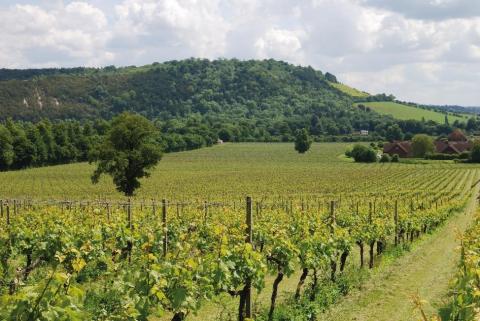As cool climate viticulture expands rapidly in England and Wales, our research capitalises on the Met Office’s launch of new UKCP18 climate projections to map and analyse climate trends and impacts on UK grape-growing. Recognising that the typical lifetime of a cool-climate vine is around 35 years, we explore how critical growing season characteristics – including frost risk – may change over the coming decades. We are also analysing ways to support climate change adaptation in UK wine production by mapping climate risk and adaptation behaviours along the value chain, from production to consumption. The project aims to translate model results into more user-relevant information, contextualised to suit the detailed needs of different stakeholders, so as to inform decision-making, investment and adaptation. Understanding how different parts of the sector may be affected by and respond to climate stresses and opportunities, meanwhile, will identify ways to support this rapidly expanding agricultural sector to be more economically sustainable.
The cultivation of wine grapes under cool-climate conditions in England and Wales is rapidly expanding and resulting sparkling wines in particular are winning international awards and acclaim. Warming growing season trends associated with global warming are supporting growth in vineyard numbers and the planting of more consumer popular grape varieties, while also attracting significant international investment interest. However, while the 2018 growing season has produced a record harvest, in very grape-friendly growing conditions, year to year fluctuations in climate still regularly threaten the sustainability of the sector. Yields are still on average less than one third of those found in the Champagne region of France, for example, and in certain years such as 2012, some English vineyards harvested no grapes at all. The proposed collaboration is between the London School of Economics and the University of East Anglia. Researchers at each institute have highly relevant experience, for example, the team includes a wine sector specialist, a climate scientist and a social scientist with experience of adaptation in businesses. The first aim of this research is to capitalise on the launch of new future climate change projections for the UK to assess how critical growing season characteristics for wine grapes may change over the coming decades. We propose to develop our research which has focused upon the development of the wine sector up to now, to show how future climate trends out to 2050 may influence the sector, and thereby offer guidance to enhance the sector’s resilience to climate change. Second, working directly with the national organisation for grape growers and winemakers (Wines of Great Britain), we will examine how businesses make decisions about adapting to future climate change, thereby helping to ensure that this fledgling industry has a bright future.
As yet, there is limited information about climate change that wine producers or investors can use for decision making. The research has the following objectives:
- To produce a very detailed dataset of air frost risk (still a critical hazard for grape growth) to more accurately quantify local frost risk and hence site suitability for growing grapes (viticulture) in the current climate.
- To develop indicators of climatic risk under future climate change for the 2030s and 2050s based on newly available climate model projections for the UK.
- To assess decision-making processes with respect to adaptation in the wine sector and examine the role of perceptions of climate change risk and opportunities in decision-making.
The wine sector can be used as an example of an ‘early adopter’ of climate adaptation in the UK through which there is an opportunity to study the process by which businesses are making decisions about risk management. Since the overall direction of change in climate has been positive for UK wine production this proposal focuses, unusually, on both the opportunities and risks of climate change. Our research will use a multi-methods approach. Climate science for the development of new climate projections and climatic risk factors. And social science or qualitative methods (interviews and survey) to understand the resilience and behavioural dimensions of adaptation. The research is designed to generate practical support for adaptation to climate change in the UK (climate resilience) particularly for, but not restricted to, the wine sector. Informed by our longstanding relationship with stakeholders in the wine sector we will advise national climate change assessments and policy processes through consultation. We will work alongside Wines of Great Britain to ensure a co-designed and shared approach. We will work with a Communications and Policy team to identify audiences and the main messages from our results and prepare a Policy Brief for decision-makers and a short video that captures our key recommendations (watch below).
Watch our latest video on how farmers can adapt to climate change in the UK, produced by the Centre for Ecology & Hydrology.
Watch Climate Resilience webinar, 21 October 2020: Characterising and adapting to climate risks in the UK wine sector with Declan Conway (Grantham Research Institute, LSE), Dr Alistair Nesbitt (Vinescapes), Dr Kate Gannon (GRI), Prof Steve Dorling (University of East Anglia). Part 1, part 2, part 3 and part 4.
Publications:

